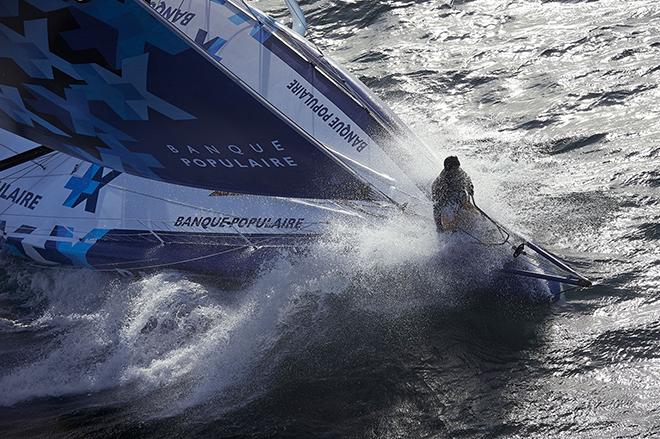Vendee Globe - One tack holds key to Vendée Globe glory
by Vendee Globe on 18 Jan 2017

Banque Populaire - Armel Le Cleac'h - Vendee Globe 2016/17 Vendee Globe
http://www.vendeeglobe.org
With less than 40 miles separating Vendée Globe leader Armel Le Cléac'h from second-placed Alex Thomson this morning and under 400 nautical miles left to the finish line, victory in the solo round the world race now comes down to one crucial last manoeuvre.
Le Cléac'h and Thomson, who have been practically neck and neck over the 24,000nm they have covered since the Vendée Globe began on November 6, have been forced to sail much further north than the latitude of the finish line in Les Sables d'Olonne, France, by an anticyclone blocking their route home. But with the centre of the high pressure system moving north-east over the south of England the door to Les Sables will finally open and both skippers will be able to point their bows towards the finish line. Herein lies the deciding moment of the Vendée Globe 2016-17: picking the right time to tack.
The duo were this morning in decreasing south-easterly winds of 10-12 knots sailing at the latitude of Brest in Brittany. But as they get nearer to the coast the wind is forecast to gradually swing to the north-east and at this moment they will be able to tack onto port and begin the final sprint. The home strait is marked with pitfalls – the islands of Groix, Belle-Île and Yeu will disturb the breeze, the currents in the area are known to be tricky and the coastline is busy with shipping and fishing traffic. It may just be that these obstacles give Hugo Boss skipper Thomson the opportunity he needs to usurp Le Cléac'h and Banque Populaire from the top spot in the final 36 hours of the race.
At 0400 UTC it was Le Cléac'h, runner-up in the last two editions of the Vendée Globe, who had the speed advantage, making just shy of 15 knots compared to Thomson's 10. Both boats are set to arrive in Les Sables on Thursday. The tracker will update hourly once the leader gets to within 100nm of the finish.
More information on how to follow the finish of the Vendée Globe can be found
here.
Jérémie Beyou in third, some 800 miles behind, is likely to finish around two and a half days behind Thomson and Le Cléac'h thanks to a relatively stress free final 1,000 miles. The same can't be said for fourth-placed Jean-Pierre Dick, who has a fight on his hands to defend his position from Yann Eliès and Jean Le Cam. Dick faces having to cross a windless patch almost 200nm wide before sailing west of the Azores to lock into an Atlantic depression, providing his chasers with an opportunity to completely wipe out the 60nm that currently lie between them.
Louis Burton in seventh place is into the Doldrums, his speed plummeting to three knots this morning while Nandor Fa in eighth continues to make steady progress north towards the Equator in the South Atlantic trade winds. Conrad Colman was this morning bashing upwind at eight knots despite having 30 knots of breeze but he was twice as quick as Eric Bellion, around 250 miles to the north-west. Meanwhile Fabrice Amedeo and Arnaud Boissières have opted to skirt the Falkland Islands to the east, in contrast to Alan Roura and Rich Wilson who have chosen a westerly of the British territory. Didac Costa in 15th place was today 600 miles from Cape Horn with Romain Attanasio 100 miles further back. Pieter Heerema in 17th extended his lead on 18th-placed Sébastien Destremau to take the gap splitting them to 1,100nm.
Quotes
Romain Attanasio (Famille Mary-Étamine du Lys): “I have some wind. 30-35 knots associated with a low-pressure system. It’s rotten weather and is raining, but I am 765 miles from Cape Horn. I am going to be able to sail along quickly with this low, before the next one catches me. That’s the one that has been worrying me a bit, as it is huge and I’m going to get hit by it as I pass through Drake Passage. I hope it won’t be as violent as forecast. I don’t want to get to the Horn with fifty knot winds.”
Arnaud Boissières (La Mie Câline): “I’m close to the Falklands. So close that I almost got stuck here for a few days. There was a small low pressure cell with a NW’ly air stream that came up against a southerly wind. I had puffs of air coming from all directions and that led to a big area of calm. On top of that I got stuck in some seaweed. I thought I had run aground. There was weed everywhere, but that’s behind us now. I couldn’t see the Falklands as the visibility was so poor.”
If you want to link to this article then please use this URL: www.sail-world.com/151165